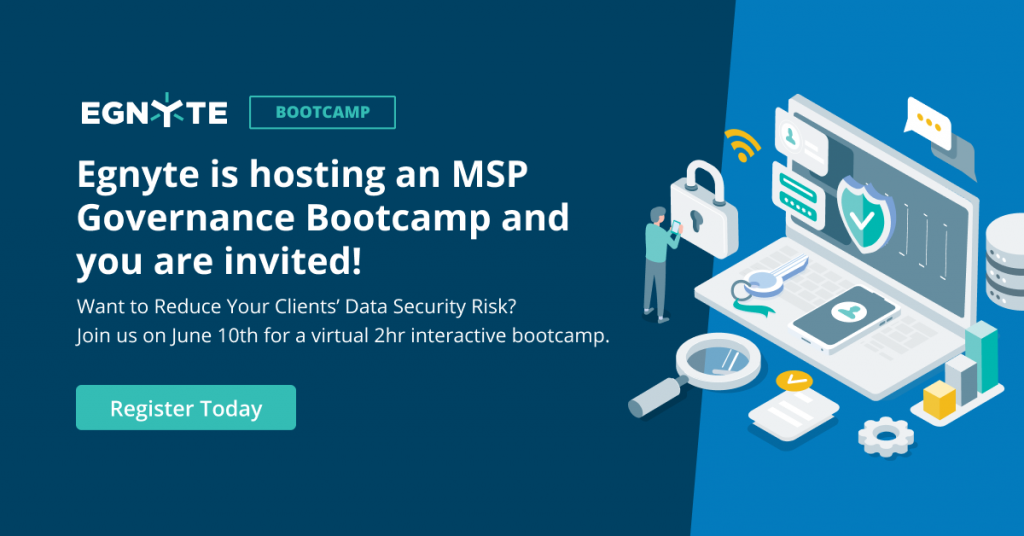
5 Things Every MSP Should Know About Data Governance
For a managed service provider (MSP), answering questions about data governance—specifically data security and privacy—is a vital part of the job. Understanding the complexities of content management systems, automation, and more ensures you are at the top of the data security field.
Maintaining file and data security is a fact of life—usually by force of law. However, it’s a subject not many of your clients will ever fully understand. Staying up to date on data governance encourages high standards and better compliance while enabling you to answer the inevitable security questions a client will throw at you. And it helps you highlight the value of your service, create new revenue streams, and scale your sales infrastructure.
1) Multi-Tenant Content Management Systems Simplify Data Governance for Multi-Site Management
Multi-site management can be a boon for streamlining data governance because it simplifies management processes. Multiple sites sharing one dashboard enables brands to grow beyond one country, one language, and one project.
In a single-tenant relationship, each site has a database, dashboard, and data inaccessible by other sites, even within one brand. In a multi-tenant relationship, each site pulls from the same shared database and has the same dashboard. It’s useful for eCommerce brands because they often want multiple sites that use the same inventory database.
You can sell the value of a multi-tenant system to your client like this: It costs less. One bigger plan costs less than paying for multiple smaller plans. A multi-tenant system will also keep content safer because there’s only one databank to keep track of instead of many. That streamlines your access to these sites, too, because you’ll be able to manage multiple different sites from the same portal.
2) Automation Makes Data Governance More Accurate
Data governance means checking for compliance, security, content sprawl, and more. However, data changes on a regular basis, so data governance needs to change, too. That means either maintaining an ongoing manual process or automation—and data governance automation can make compliance easier by simplifying the job.
Automation can help catch issues right as they arise because while you’re only human, software can know all the important rules and watch everything in the database at once. Say you’re working with a client that needs to follow the NIST guidelines. In that case, either you or an automation has to keep track of more than 2,000 separate rules—and automation is going to be better at it than you are.
It’s your job to ensure that your clients’ data is safe, secure, and well-managed. Automating simple tasks like monitoring and update notifications simplifies your job, leaving more time for the complex tasks that require a human hand. In addition to boosting personal productivity, automation can increase visibility into your clients’ data, making analyzing all data much easier.
3) Regular Data Compliance Audits Eliminate Dangers Faster
A data compliance audit checks whether or not a company is following the laws and regulations that apply to its data. Normally, companies don’t do them very often, but you should do them weekly; you'll catch problems early and save time and money down the road.
All data is not equal. Know what type of data your client has and what laws or regulations their data must follow. Yearly audits catch errors, but sometimes those errors are 11 months old. Weekly audits can eliminate future risks before they become real issues.
Run regular audits that tell you about the compliance and security of your client’s files. You’ll be notified right away so that you can step in and remedy the situation before it becomes a bigger issue and costs you valuable time and resources.
4) Cloud Storage Improves Access Management
With each passing year, less data is kept on an internal server and more is saved on a cloud. That lets you and your client’s team access anything from anywhere. But cloud-based data comes with security concerns; you need to make sure that anyone who doesn’t need to see the files can’t see them.
The move to fully remote work means more sensitive and traditional data needs to be accessible from everywhere—by only the right people. A solid cloud strategy helps ensure that everyone who needs access has it and no one else. Egnyte’s Public Cloud Connector is one way to manage the shift to popular cloud services like AWS and Microsoft Azure by streamlining the transfer of data with real-time file synchronization.
Encourage clients to choose a tailored and specific platform that keeps their data needs and privacy concerns in mind. For example, an AI-power option that can track downloads, letting you know if one IP address is downloading many files at once.
5) Auditing Google Workspace and Microsoft 365 Helps Security
Many companies use either Google Workspace or Microsoft 365. But they can easily lose track of how they’re sharing and storing documents—compromising security and causing unnecessary content sprawl. It’s your job to understand the pitfalls of these cloud providers and how to get around them.
Google Workspace and Microsoft 365 are large programs that your clients might not know how to manage correctly. Sharing files can lead to accidental security breaches, while an unclear file structure can lead to outdated content—making it harder to ensure all vital data is protected properly.
Showcase how you can make programs like these more secure through systems like Egnyte, which works as a governance layer on top of your own skills and expertise. Being able to manage these large-scale tool suites effectively also widens your potential pool of clients, many of whom struggle with handling their infrastructure internally.
Prove Your Value with Data Governance
Staying up to date on data governance trends enables you to help your clients more effectively and impress new potential businesses that need your help. Don’t stop learning about ways you can further increase your ability to ensure security and compliance.
Egnyte’s upcoming MSP Bootcamp is one great way to learn more about what’s new and important in managed services and data governance.






